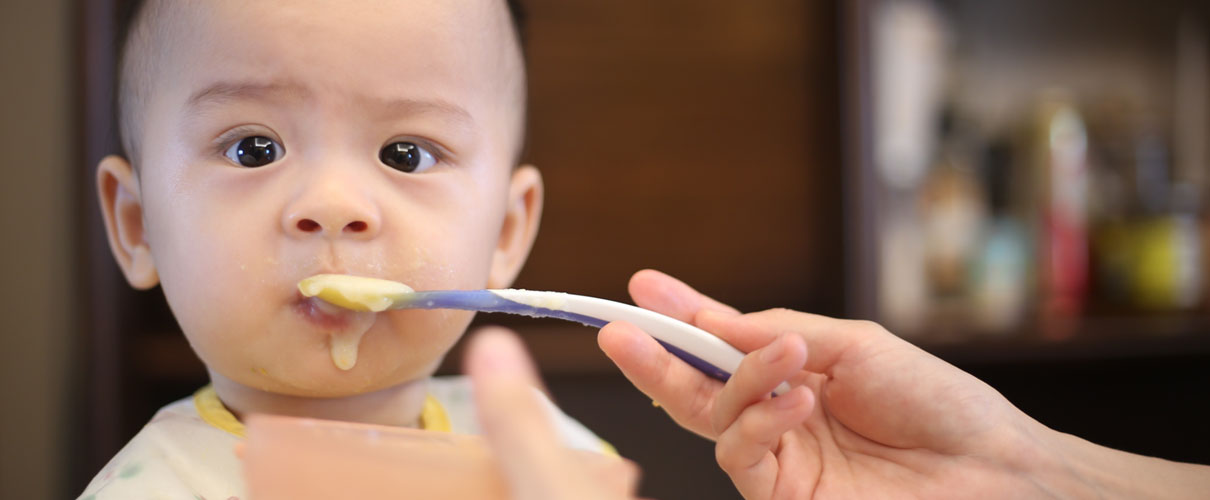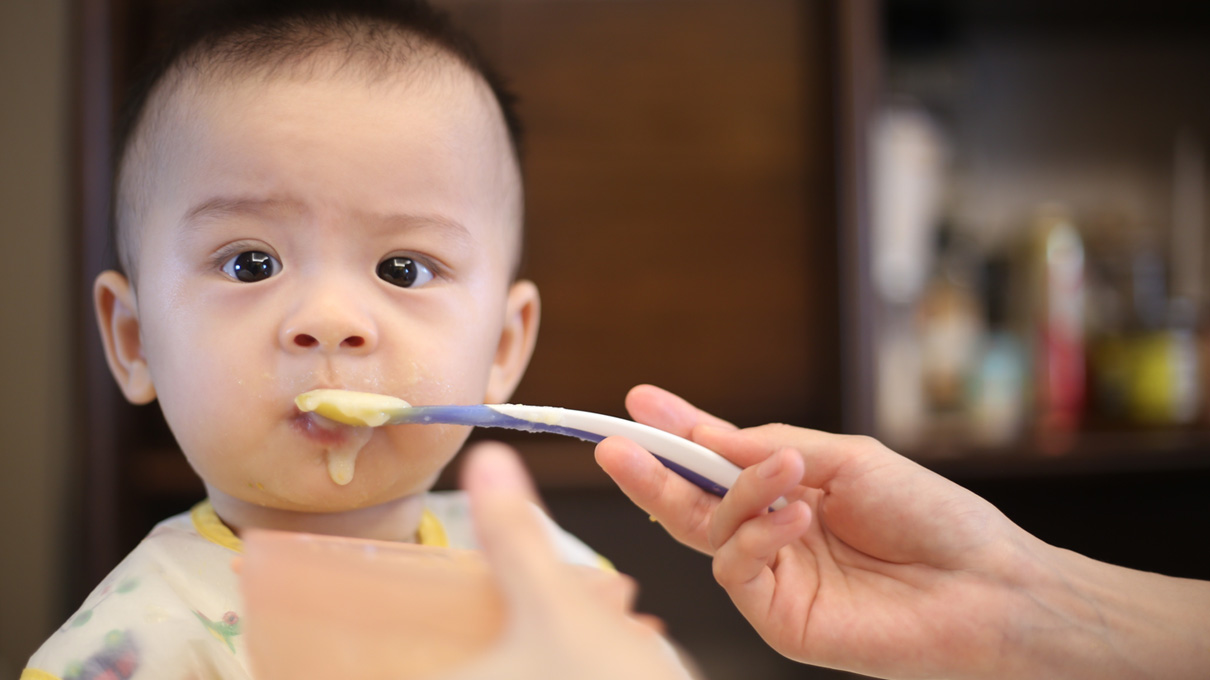

Weaning
Your baby will survive perfectly well for the first six months on milk alone, whether breast or formula, but around this time s/he will be ready to try 'proper' food, on the way to enjoying family meals with you. It used to be recommended to wean much earlier, but research has shown that your baby's digestive system is not fully developed until six months. If you feel your baby is ready slightly earlier, do resist if you can, especially if there is a history of allergies in your family, and consult your doctor or health visitor first. In any case, you should never start weaning before 17 weeks. If s/he's starting to show an interest in what you eat, is reaching out for your food, or s/he still seems hungry after a full milk feed, now could be the time to start the baby on solids. You may also find that s/he's started waking more at night, having previously slept through.
Start by offering solids once a day, just to see how s/he copes. Give a small amount on a baby spoon or the end of your finger, but only try when s/he's happy and not too hungry. Don't worry if s/he spits it out - s/he's just getting used to what it feels like in the mouth, besides, the milk will provide the nutrients s/he needs for the time being. The most common 'first food' is baby rice, made up with a small amount of your baby's normal milk, but any bland flavours will do. As s/he gets more used to the idea, introduce new flavours and increase the frequency of solid feeds. Generally speaking, by eight months, your baby should be eating three solid meals a day, plus about 600ml (1 pint) of milk.
At first, offer purées of vegetables and fruit, such as carrots, sweet potato, parsnip, apple or pear, making them quite runny at first, then increasing the thickness as s/he gets used to eating. Getting the baby used to a variety of flavours now will help for more adventurous flavours later on. It is important to introduce texture and get your baby chewing, as this will help with speech development as s/he gets older. If there is a history of allergies in your family, avoid these foods for now.
Making your own food gives you complete control over what your baby eats, but don't beat yourself up if you can't do this all the time. There are plenty of organic brands of baby food to choose from, and these can be really useful for days out and holidays. If it helps, make up a large batch of food and freeze in individual portions for a quick, convenient meal at a later date. Also, try to think of ways you can adapt what you're cooking for yourself, so that you don't have to cook twice.
As your baby gets older, you'll find that, even without many teeth, the baby can chew through a finger of toast or a rice cake. Introducing these foods is important as it helps develop the hand-eye co-ordination and fine motor skills. Let the baby use cutlery too (but be prepared for big-time mess at first!) - you may find it useful to have a spoon each to make the meal time quicker. S/he'll also be able to cope with increasingly lumpy food, so that by the time s/he's one year old, s/he'll be eating something that at least vaguely resembles the food you eat, ideally feeding oneself so you can enjoy your own meal while it's hot! Whenever your baby is feeding, keep a lookout to make sure s/he doesn't choke.
Healthy eating for babies
Bear in mind that your baby has a small stomach but is growing rapidly, and therefore has different dietary needs to an adult. A child needs lots of calories and nutrients in a small amount of food, so don't give 'low-fat', 'low-calorie' or 'high-fibre' foods. Fat gives your baby energy and provides some vitamins that are only found in fat, so choose full-fat dairy foods. High-fibre versions of foods, especially those with added bran, can prevent babies absorbing important minerals such as calcium and iron, so don't give your baby brown rice, wholemeal pasta or bran-enriched breakfast cereals until they are older; some brown bread is fine.
Good choice
- Starchy foods: aim to give 2-3 servings a day of starchy foods such as potatoes, yams, rice or bread.
- Fruit and vegetables: you may not make it to five a day at first, but it's good to head in this direction so try to include them at two or more meals each day. As your baby gets older, these make good finger foods.
- Meat, fish or pulses: give one serving of soft cooked meat, fish, egg, tofu or pulses such as beans or lentils (dahl) a day. Red meat such as beef, lamb and pork is an excellent source of iron.
- Eggs (well cooked): a quick, nutritious and cheap source of protein.
- Oily fish: include one portion of oily fish per week, eg, salmon, sardines.
- Dairy products: yoghurt, cheese and fromage frais are a good source of calcium.
Bad choice
- Sweet treats: giving sweet biscuits and rusks will encourage your baby to get into the habit of expecting sweet snacks.
- Salt - a young baby's kidneys can't cope with it, so don't add it to any food you cook for your baby. It is banned from ready-made baby foods. Some foods, such as cheese, sausages and bacon, are high in salt, so limit how much of these foods you give. Also, any foods that aren't specifically 'baby food', eg, sauces and ready-made porridge, can be high in salt, so limit how much of these you give and do check the label. If you're giving food you have prepared for the rest of the family, remove his portion before seasoning.
- Sugar: sweetened puddings, biscuits, sweets and ice creams are not recommended for babies under a year. Good dental health starts even before teeth have formed.
- Honey: not recommended until one year old as it occasionally contains a type of bacteria that can cause infant botulism. It's also a sugar.
- Nuts: as well as being a common allergen, they are also a choking hazard. Whole nuts should not be given to under-fives for this reason, although nut butters are fine for toddlers, as long as there is no allergy problem.
- Certain fish: shark, swordfish or marlin are not recommended as the levels of mercury can affect a baby's growing nervous system.
- Raw or runny eggs: this is due to the risk of salmonella. Completely cooked eggs are fine.
- Cow's milk should not be given as a drink until your baby is one year old; its make-up is very different to that of breast or formula milk. It is, however, fine to use in cooking.

